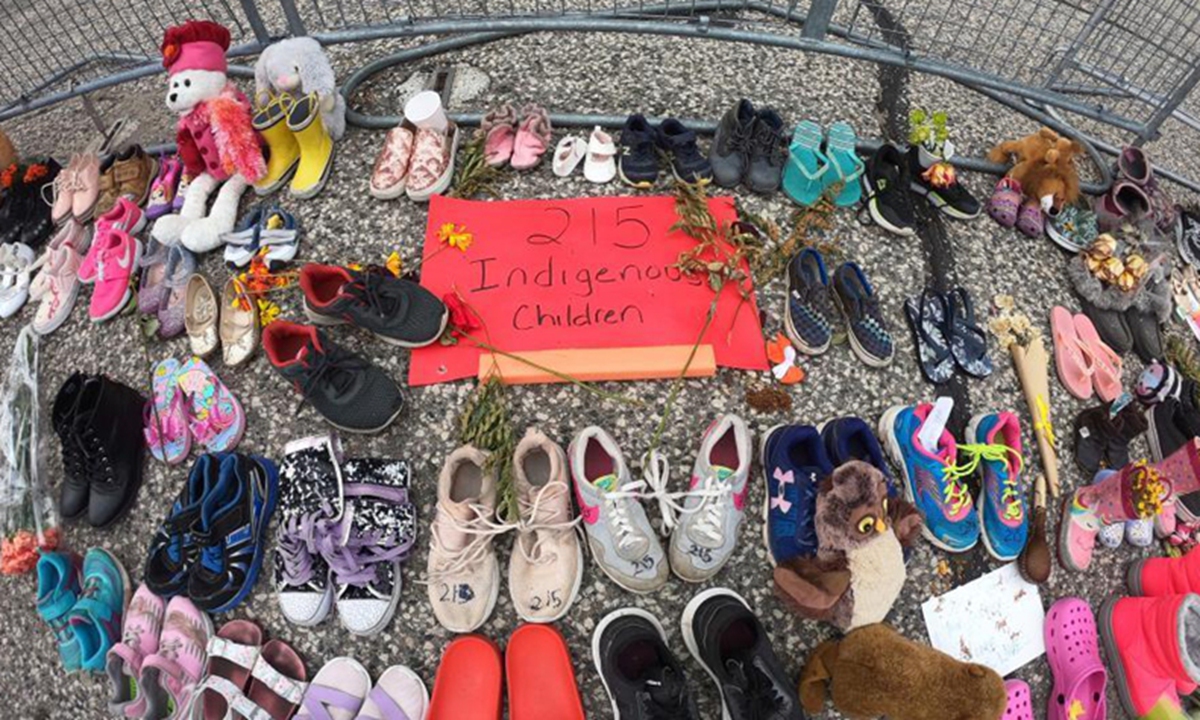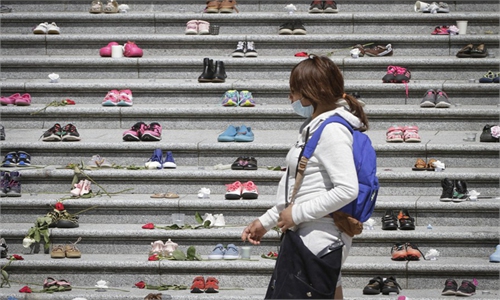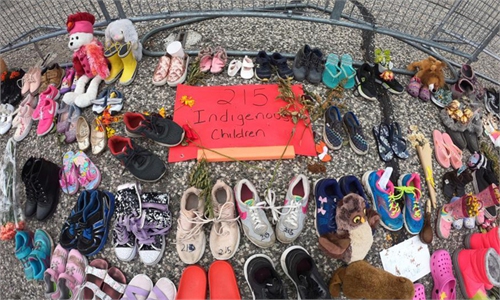
Children's shoes, dolls, flowers with notes at the front of Legislative Assembly of Ontario, Canada, to commemorate the deaths of 215 Indigenous children whose remains were found in a former residential school in Kamloops city in the country, June 2, 2021. Photo:China News Service
Cardinal Thomas Collins of the Roman Catholic Archdiocese of Toronto issued an apology on Sunday about the recent tragic discovery of 215 Indigenous children's remains which were found at a former residential school in British Columbia. The Toronto Sun newspaper quoted Collins as saying that there has been journey of reconciliation with the Indigenous people, which he noted "takes time.""Reconciliation" has been put forward for years in Canada, but it has failed to essentially help solve the deep-rooted Indigenous issues.
The Indigenous peoples of Canada - First Nations, Métis, and Inuit - are actually treated differently by the Canadian government. The Inuit, who inhabit the Arctic regions, have enjoyed better quality of life due to preferential policies than the other two groups, because the Arctic regions are closely linked with Canada's national interests.
Generally speaking, the current Trudeau administration has done more than its predecessors in the Indigenous governance, with various new acts and amendments proposed in the past few years. Canadian Prime Minister Justin Trudeau received strong support from the Indigenous peoples in the 2015 federal elections. Some might even say that he was taken into office by the Indigenous peoples, who strongly hoped that Trudeau would bring about real changes. However, his administration has not done enough to make profound improvement in the Indigenous issues.
Canada is famous for its human rights diplomacy. It has signed up almost all declarations or statements about human rights in history. However, Ottawa has gone another way in terms of its own Indigenous issues. It voted against, with only three other countries - Australia, New Zealand and the US - the United Nations (UN) Declaration on the Rights of Indigenous Peoples that was adopted by the UN General Assembly in September 2007. This was in stark contrast to Canada's international image as a "banner holder" of human rights.
Neither the Stephen Harper administration nor the Trudeau administration has adopted the proposal of using the UN Declaration as the basic framework for Canada's Aboriginal law. This shows that Canada's questionable attitude and approach to the Indigenous issues have created structural barriers to the "reconciliation" with the Indigenous peoples.
The country's governance of the Indigenous peoples is still based on the 145-year-old Indian Act, as well as Section 35 of the Constitution Act of 1982 under the administration of Pierre Trudeau. As former Canadian Minister of Justice Jody Wilson-Raybould, a descendent of the Indigenous peoples, once said, "It is imperative to understand that in Canada's history, government legislation has been a central weapon in the oppression of Indigenous peoples… This remains, for the most part, the legislative reality today federally and provincially."
There are also fundamental conflicts of interest between Indigenous and non-Indigenous peoples in several areas, including economics and the environment. Particularly in several western provinces in Canada, such as Alberta, problems like energy development often lead to conflicts between the two peoples. Although the incumbent Trudeau administration has expressed its determination to resolve Indigenous issues through reforms, it has not come up with an effective strategy to address these structural conflicts of interest.
In general, the federal government has failed to solve the unequal distribution of rights and benefits between local governments and the Indigenous peoples.
Sandlanee Gid, an instructor of reconciliation studies at the University of British Columbia and the Haida Gwaii Higher Education Society, once commented that "reconciliation means that you had a good relationship to begin with and then you're reconciling the relationship... But the relationship [between the Canadian government and Indigenous peoples] has never been good."
In fact, in retrospect, when the British and French colonists first arrived in North America, they had a relatively equal relationship with the Indigenous peoples. This is because the colonists depended on them in many ways. But once the colonists had consolidated their position, they began to suppress the Indigenous peoples. And after the Indian Act came into effect, the extremely cruel Indian residential school system emerged in Canada. Therefore, it saw a fundamental change in the status of the Indigenous peoples in the country.
The issue of the Indigenous peoples is a highly political issue in Canada's politics. Every government, be it at the local or federal level, usually puts the issue on the agenda, but it's not certain how much the government could do with it. After all, the issue doesn't receive enough attention from the government.
Vote is one of the most important considerations for the government. The proportion of the Indigenous peoples in Canada's population is not large. Their participation in politics and their influence on voting are relatively small compared to other ethnic groups. As a result, neither the federal nor the local governments would give the issue concerning the Indigenous peoples much attention. The issue is even placed behind other agendas such as global governance and assistance to underdeveloped countries.
Although the Canadian government is making efforts to slowly advance and make improvements, such as offering more support to guarantee access to clean water and enhancing education investment for the Indigenous communities, they are hardly achieving fundamental reconciliation.
Consequently, various conflicts will continue to occur. The various review and reform plans proposed by the government may take from a few years to a few decades to realize.
The author is a research fellow with the Center for Canadian Studies, Guangdong University of Foreign Studies. opinion@globaltimes.com.cn



